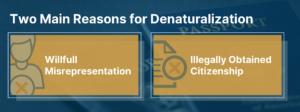
The Denaturalization Process: Can U.S Citizens Be Deported?
If you become a U.S. citizen through naturalization, it is possible—although rare—for your citizenship to be removed and for you to be deported through the denaturalization process. In this article, you’ll learn the circumstances that can lead to denaturalization, how to avoid this complicated situation, and what to do if you face deportation through denaturalization.
Consulting with the Chicago deportation defense Lawyers at Scott D. Pollock & Associates can provide essential guidance during such situations. Call us at (312) 444-1941 for help.

What Is Denaturalization?
Denaturalization removes your status as a United States citizen after you have completed the naturalization process. After denaturalization, the U.S. government will no longer recognize your U.S. citizenship. Denaturalization can be a controversial legal procedure because, in many cases, it wastes time and resources.
Denaturalization is considered appropriate if an individual is convicted of an egregious crime like immigration fraud, funding terrorist groups, or war crimes.
According to ILRC’s 2020 Denaturalization and Revocation of Naturalization Practice Advisory, between 1990 and 2017, there were only 11 denaturalization cases per year on average. However, in 2018, the U.S. government created a new department within the U.S. Citizenship and Immigration Services (USCIS) to aggressively pursue denaturalization cases.
While USCIS referred 1,600 new denaturalization cases (a 600% increase) to the Department of Justice in 2018, the number of people who have lost citizenship and face deportation through this process remains small.
Can a Natural Born Citizen Lose Citizenship?
Natural-born U.S. citizens maintain citizenship through the 14th Amendment, so they cannot be denaturalized or deported. However, a citizen can choose to renounce their citizenship.
Reasons for Revoking Naturalized U.S. Citizenship Through Denaturalization
We receive many questions about denaturalization, such as “Can you lose your citizenship if you commit a felony?” and “Are there three ways to lose citizenship?” But let’s focus on the most basic question:
“How can you lose your citizenship?”
There are two main reasons for denaturalization:
- If the naturalization process included willful misrepresentation or concealment of material fact
- If the naturalization process was done illegally
Denaturalization Because of Misrepresentation or Concealing Facts
Denaturalization can occur when you lie on your application or in your naturalization interview about prior or current affiliations. For example, the U.S. government denaturalizes individuals who didn’t disclose they were or currently are in a terrorist party (e.g., the Nazi Party or Al-Qaeda).
Denaturalization Because of Immigration Fraud
The U.S. will revoke citizenship if a person obtains their United States citizenship illegally. For example, if the U.S. government discovers an individual obtained citizenship through marriage fraud, that person might be deported through denaturalization.
Other Reasons for Denaturalization
If the naturalization process was legal, there are two more reasons a person might face denaturalization:
- Joining a terrorist group in the five years after gaining U.S. citizenship.
- If you gained U.S. citizenship through military service, denaturalization could occur if the military dishonorably discharged you less than five years after you began service.
How to Avoid Denaturalization
Denaturalization is rare but does occur. In addition to being truthful and not committing crimes that lead to denaturalization, you can avoid the possibility of denaturalization by working with an experienced and knowledgeable immigration and naturalization attorney like the ones here at Scott D. Pollock & Associates, P.C.
Naturalization is a legal process that requires time, commitment, attention to detail, and meeting specific certain criteria. Going through the naturalization process with an experienced attorney means that your path to citizenship is traveled correctly and legally, avoiding the possibility of denaturalization.
Denaturalization and Family
Unfortunately, if you face denaturalization, your family members who joined you in the United States on a family visa and obtained citizenship can also be denaturalized.
Losing U.S. Citizenship for Reasons Other Than Denaturalization
Renunciation is another path to losing naturalization and birthright citizenship status.
While denaturalization is having your citizenship removed involuntarily, renunciation is when you give up your citizenship voluntarily. The U.S. government considers renunciation an expatriating act.
If you commit an expatriating act without the intent of removing citizenship, you can defend your decision to maintain dual citizenship or U.S. citizenship.
| Expatriating Acts | |
|---|---|
| Becoming a citizen of another country after turning 18 | If you willingly become a citizen of another country, the government might view your decision as choosing that country over the U.S. |
| Swearing loyalty to another country after turning 18 | If you openly declare your loyalty to another country, the government could view your decision as a sign you no longer want to be a U.S. citizen. |
| Joining another country’s military, especially if that country is hostile to the U.S. | This decision could be seen as a significant conflict of interest and a sign that your loyalty now lies with another country. |
| Working for another country’s government after turning 18 | If you work with another country's government, especially if you swear allegiance to that country or have citizenship there, it might be seen as a sign that you're moving away from your U.S. nationality. |
| Formally saying you no longer want to be a U.S. national | You can officially state to official U.S. personnel that you no longer wish to be a U.S. national inside or outside the U.S. |
| Being convicted for treason | This serious crime is a betrayal of the U.S., leading to loss of nationality. |
The Court Process to Revoke Citizenship
The federal court is the decision-making body responsible for revoking U.S. citizenship—usually at the local district court. The denaturalization process is not an immigration court case or decided by an immigration judge.
When denaturalization occurs, it is part of federal civil law. If denaturalization occurs, your immigration status will change, but the case remains civil.
You can (and should) seek assistance and representation from your immigration attorney. An immigration attorney is the most qualified to represent you in a denaturalization case. You can represent yourself as a defendant, but immigration and federal laws are complicated, so it’s best to hire an experienced immigration lawyer.
Burden of Proof
The path to U.S. citizenship through naturalization is long and complex. You have likely worked hard and overcome many obstacles to earn your citizenship.
When you become a naturalized citizen, the government acknowledges your new status and grants you the full rights of any U.S. citizen, whether native-born or naturalized.
The court system requires the government to meet a very high evidentiary burden to revoke your citizenship through denaturalization. In short, denaturalization can only occur under extremely narrow circumstances that meet strict legal standards. Your rights as a citizen are firmly protected.
Appealing Denaturalization Decisions
You may appeal your denaturalization decision if you believe the lower court made legal errors.
If you are facing denaturalization, your best defense will depend on the specific reasons USCIS initiated proceedings and the stage your case is in (e.g., whether it is in the early stages or at the appeals stage).
Some possible defense arguments against denaturalization include showing that the government had the wrong information or that the statute of limitations has expired.
Successfully appealing a denaturalization decision requires a nuanced understanding of the law. An immigration attorney will be able to identify any legal errors made in your case.
You do have the option to appeal a denaturalization decision. If the appeal is unsuccessful, deportation proceedings may be the next step.
If you are denaturalized, there is a chance that you will not be deported. You may return to the same lawful permanent resident status (LPR) you held before gaining citizenship. However, if the reason for your denaturalization is also grounds for deportation, your removal proceedings will begin immediately.
Contact an Immigration Attorney Today
The attorneys at Scott D. Pollock & Associates, P.C. are ready to represent you and answer your questions about citizenship and denaturalization. With more than 70 years of combined experience in immigration law, we can and will help you with citizenship, naturalization, and denaturalization questions. Call us at 312-444-1940 or fill out an online contact form today.
Not ready for citizenship yet? You can learn more about a temporary I-551 stamp, green card replacement, and how to maintain lawful resident status by working with the Chicago immigration attorneys at our law office. We look forward to hearing from you!

